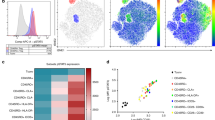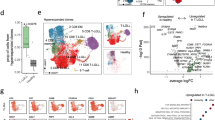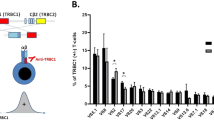Abstract
Three-color flow cytometry immunophenotyping revealed significant increases of CD57+ and CD28− cells among both circulating CD4+ and CD8+ T lymphocytes of untreated hemato-oncological patients (n = 54) as compared to healthy donors (n = 55), with CD57 and CD28 expression on the patients’ T cells being largely reciprocal. Marked expansion of CD57+ cells among circulating CD4+ T lymphocytes was frequently detected in patients with chronic leukemia of B cell origin (B-CLL, hairy cell leukemia) but not in patients with chronic myeloid leukemia, suggesting a causal relation with the tumor’s major histocompatibility complex class II expression. Using immunomagnetic separation techniques, we further demonstrate that the patients’ CD57+/CD28− T cells display a typical Th1-type cytokine secretion profile upon anti-CD3 stimulation, with a markedly higher secretion of the Th1-type cytokines IL-2, IFN-γ, and TNF-α than their CD57−/CD28+ counterparts. Cytotoxic activity of circulating CD8+ T lymphocytes, measured ex vivo in an anti-CD3-redirected assay, was almost exclusively exerted by the CD57+/CD28− subset. Moreover, a marked cytotoxic activity was detected within CD4+CD57+ T cells from some B-CLL patients. Finally, the patients’ CD57+/CD28− T cells displayed an increased tendency to apoptosis in culture. Collectively, our results indicate that the expanded CD57+/CD28− T cells in hemato-oncological patients represent differentiated effector cells, similar to their (quantitatively minor) counterpart in healthy donors. The reason for their expansion and their pathophysiologic significance, however, remains unclear.
This is a preview of subscription content, access via your institution
Access options
Subscribe to this journal
Receive 12 print issues and online access
$259.00 per year
only $21.58 per issue
Buy this article
- Purchase on Springer Link
- Instant access to full article PDF
Prices may be subject to local taxes which are calculated during checkout
Similar content being viewed by others
Author information
Authors and Affiliations
Rights and permissions
About this article
Cite this article
Van den Hove, L., Van Gool, S., Vandenberghe, P. et al. CD57+/CD28− T cells in untreated hemato-oncological patients are expanded and display a Th1-type cytokine secretion profile, ex vivo cytolytic activity and enhanced tendency to apoptosis. Leukemia 12, 1573–1582 (1998). https://doi.org/10.1038/sj.leu.2401146
Received:
Accepted:
Published:
Issue Date:
DOI: https://doi.org/10.1038/sj.leu.2401146



